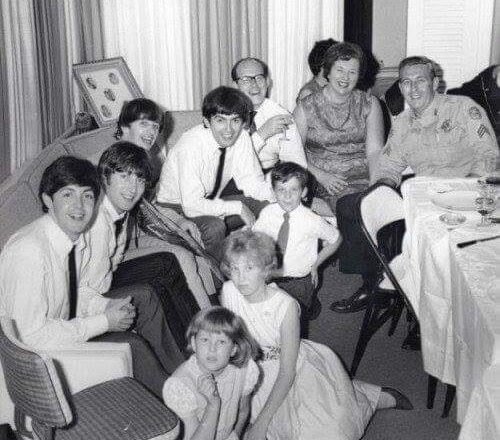The below excerpt is from Good Day Sunshine State: How the Beatles Rocked Florida by Bob Kealing. Gainesville: University Press of Florida, 2023, co-published with Florida Humanities. Reprinted with permission of the University Press of Florida.
Come see Bob Kealing at the Miami Book Fair on Saturday, November 18 at 5 p.m. Building 8, First Floor, Magic Screening Room.
Since the early 1950s, children growing up in the cluster of single-story, concrete-block homes on Northeast 160th Street in Miami Beach felt free to come and go from each other’s homes as they pleased. By 1964, the Dresners’ eleven-year-old neighbor Debbie Nelson had long been friends with ten-year-old Andrea Dresner, nicknamed Andi, and her big sister, twelve-year-old Jeri. One February afternoon, when the phone rang at the Dresner home, the neighbor girl Debbie thought nothing of answering the phone herself. “A person in a British accent said, ‘Who is this?” Nelson recalled. “I said. ‘This is Debbie. Who is this?’ And he said, ‘Paul McCartney.’ I said, ‘Paul McCartney of the Beatles?’ And he said ‘Yes, Paul McCartney of the Beatles.’ I said, ‘NO, you’re kidding!’ And at that point Buddy got on the line and said, ‘Debbie, either say hello or pass the phone on.’ So that’s when I realized Buddy was with them.”
The next day, the inquisitive neighbor girl was back at the Dresner home watching Dottie Dresner prepare for a formal dinner. For a middle-class family with no dining room, setting up card tables in the living room was as formal as they could get. Like a junior detective, she was starting to figure things out. She got with Andi and asked, “Who is coming to dinner?” Andi replied, “Uncle Harold.” Not satisfied, Nelson pulled her young neighbor outside and asked again. This time Andi relented, “The Beatles. But if they come and there are people outside, they’re just going to drive by.” Thrilled by the news but cautious due Andi’s warning, Debbie Nelson waited inside her home, watching for the arrival of the Dresners’ famous dinner guests.
Not once since the Beatles landed in America had they had a chance to enjoy some semblance of a home-cooked meal with an average American family. After all the subterfuge surrounding the Beatles visit, Buddy had finally come clean with his children and told them where their dad had been for almost a week. It was time for the Beatles to meet and thank Dottie; time for the Dresner family, and a few lucky neighbors, to have an evening they’d never forget. The Beatles’ thank-you gesture also meant a considerable amount of work for Dottie welcoming honored guests—and their sizable entourage—to her home. “She wasn’t fazed,” Buddy remembered. “She served roast beef, green beans, baked potato and strawberry shortcake. It was a dynamite meal.”
Dottie pulled the kids out of school early. They’d settled on Uncle Harold as a ruse to keep their secret from getting out. Barry, who wasn’t told who was coming to dinner, assumed it was some sort of Jewish holiday. He thought their extended family would be driving up from the south side of town, and he would have Jess, a cousin his age, to play with. A smaller card table had been set up at the end for the “kiddies.”
Late that afternoon, when a limousine and other cars pulled up, Barry shouted, “They’re here!” He watched as one man after another he didn’t recognize walked up toward him. From Barry’s diminutive perspective, at waist-level, he shook hands with each, waiting for cousin Jess to arrive. That never happened; the only person Barry recognized was the last; his father, still wearing his police uniform. Barry recalled his moment of clarity: “Wait a minute,” I thought, “This isn’t a Jewish holiday. And the Beatles are in my living room.”
As the evening went on, there came a knock on the door. Debbie Nelson, who had stayed away until the famous visitors were well into their evening, was hopeful for an introduction or, at the very least, a closer look. Still in the glow of the evening, Buddy cheerfully allowed Debbie, and other starstruck neighbors, to walk past the dinner table, single file and no screaming, to shake hands with the Beatles. Having kept the secret for twenty-four excruciating hours, Debbie Nelson was finally rewarded; she was invited to stay for dessert. “I wish I was older because I would have been able to sit there and do something other than just stare,” she recalled. “Here are the Beatles everyone screams about and I’m sitting in a room with them.”
The highly rated Sullivan appearances ensured that the Beatles had built on the success of their first American No. 1 single. The wave of popularity in America would only get bigger. Dinner at the Dresners was but a brief layover on their eventual march to immortality in America.


